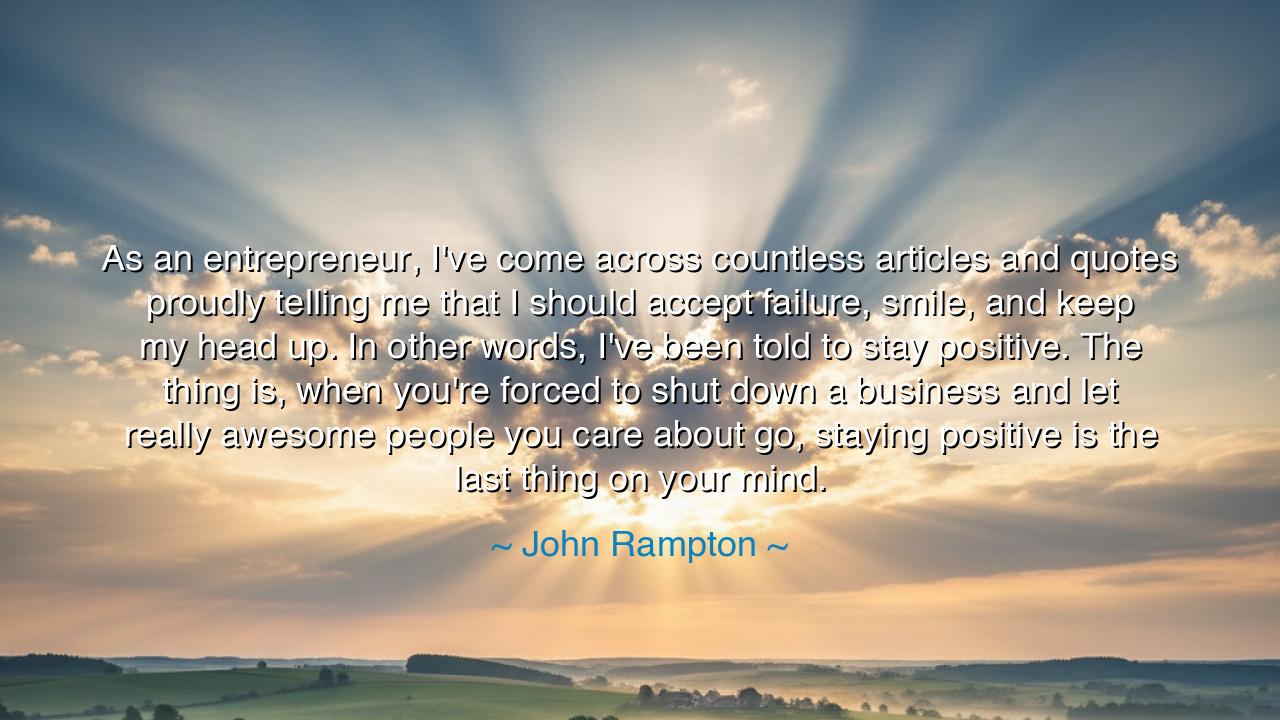
As an entrepreneur, I've come across countless articles and
As an entrepreneur, I've come across countless articles and quotes proudly telling me that I should accept failure, smile, and keep my head up. In other words, I've been told to stay positive. The thing is, when you're forced to shut down a business and let really awesome people you care about go, staying positive is the last thing on your mind.






Hear now the words of John Rampton, a voice forged in the furnace of enterprise: “As an entrepreneur, I've come across countless articles and quotes proudly telling me that I should accept failure, smile, and keep my head up. In other words, I've been told to stay positive. The thing is, when you're forced to shut down a business and let really awesome people you care about go, staying positive is the last thing on your mind.” These words pierce like an arrow, for they reveal a truth hidden beneath the easy counsel of the world: that loss cuts deeper than slogans, and that behind every closed business are human lives, human bonds, and the weight of responsibility that no cheerful phrase can erase.
The meaning of this truth begins with the hollowness of mere optimism. Smile, say the voices of popular wisdom. Stay positive, they command. But Rampton reveals the folly of such commands when spoken to the grieving heart of a leader. For the entrepreneur does not lose only numbers on a ledger, but the trust of comrades, the shared vision of a team, the dreams once built together. To part ways with those who stood beside you is not a small wound, but a breaking of covenant. To ask for instant smiles in such a moment is to ask the heart to deny its own pain.
History itself speaks of this burden. Consider the tale of Ernest Shackleton, the explorer whose Antarctic expedition failed to reach its lofty goal. He was forced to abandon his dream, not because he lacked courage, but because he bore responsibility for the lives of his crew. His greatness was not in pretending cheer when the ice crushed his ship, but in facing the grief, bearing the weight of command, and finding a way to keep his men alive. Shackleton did not smile falsely in the face of loss—he endured it, honored it, and through that honesty, saved his people.
Rampton’s words remind us of the sacred duty of the leader: that failure is not borne alone. When a business dies, so too do the hopes of those employed, the plans of families, the faith of friends. To dismiss this weight with shallow positivity is to dishonor the real cost of leadership. His confession is not weakness but strength, for he declares that grief belongs as much to the journey as triumph, and that honesty in despair is more noble than false cheer.
Yet within his words lies also a hidden flame. For though he rejects the hollow command to “stay positive,” he does not surrender to despair. His truth is this: the path of the entrepreneur, of the dreamer, of the leader, is carved through both joy and sorrow. One must learn not only to celebrate victories but to carry losses with dignity. To smile falsely is emptiness; to weep honestly and rise again is courage.
The lesson for us is profound. When loss strikes, do not demand from yourself an instant mask of joy. Honor the pain of endings, the sorrow of letting go. To grieve is not to fail, but to acknowledge the humanity in your work. And when the time of mourning has passed, rise again—not because you forced yourself to stay positive, but because truth and endurance have tempered your spirit.
Therefore, let each one act thus: lead with honesty, not with masks; face your losses fully, without shame; and when you are ready, begin again with renewed strength. For the true mark of resilience is not in false cheer, but in the courage to face despair and still choose to continue the journey.
Thus, the teaching is eternal: Life will command us not always to smile, but to endure. Positivity that ignores pain is fragile; authenticity that embraces both sorrow and hope is unbreakable. As Rampton declares, the leader’s path is not one of easy smiles, but of honest struggle, and from that struggle comes the strength to rise anew.






AAdministratorAdministrator
Welcome, honored guests. Please leave a comment, we will respond soon